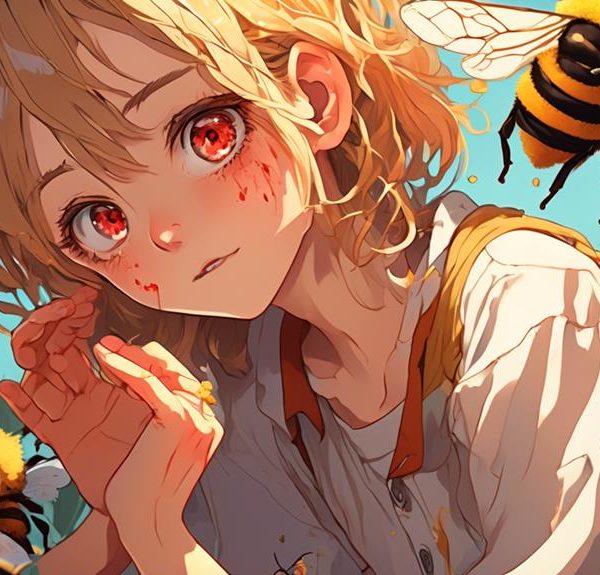Overcoming myths and fears, we unravel the intriguing question – Can bees truly sense human fear?
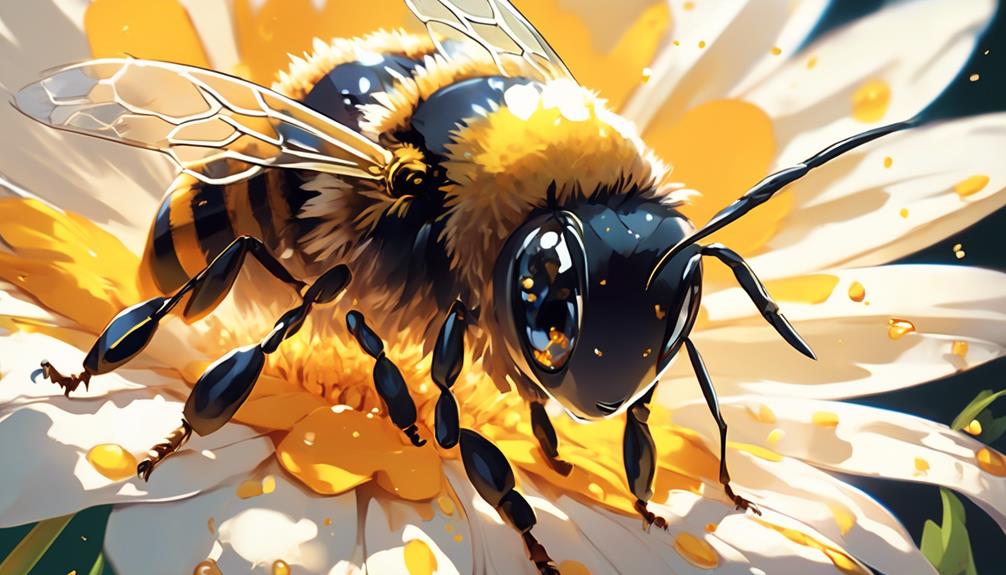
Can Bees Detect Fear?
As the sunflower quivers in anticipation of the bee's arrival, you, too, might feel a jolt of fear at the thought of the approaching insect.
You've probably wondered if the little creature buzzing around you can sense your fear. It's a fascinating question and one that's been on the minds of researchers for quite some time.
Can bees really detect fear, or is it simply a myth born out of our own trepidation? That's what we're here to explore, and the answers might surprise you.
Key Takeaways
- Bees have the ability to perceive and respond to fear through their complex dance language and olfactory receptors.
- Pheromones play a crucial role in bee communication and are essential for hive recognition, mate attraction, and alarm signaling.
- Bees can sense certain pheromones associated with fear in other creatures, including humans.
- Fear can have a significant impact on bee colonies, leading to increased aggression, conflicts within the colony, and potential abandonment of the hive.
Understanding Bee Communication
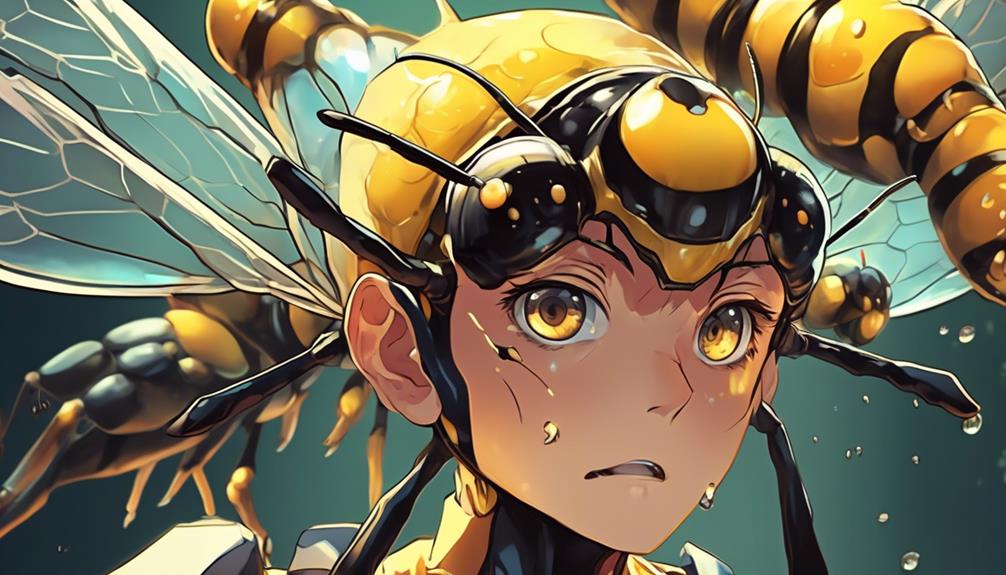
To truly grasp how bees might perceive fear, it's crucial to first decode the complex dance language they employ for communication. You see, bees aren't capable of complex thought or emotion like humans, but they communicate in a fascinating, intricate way. They use a series of movements, known as the 'waggle dance', to convey vital information to their hive mates.
This dance language is incredibly nuanced. It's not just about the wiggle or waggle, but the angle and duration of the dance. These factors tell other bees the location of food sources or potential threats. If a bee dances for a longer period, it's indicating a source rich in nectar. A sharper angle might mean a nearby danger.
But can bees sense fear through this dance? That's a more complicated question. While bees can't 'feel' fear like humans do, they can detect threats. A bee might interpret an unfamiliar scent or a swift movement as a potential danger, causing it to act defensively. So, while it's not fear in the human sense, bees can perceive and respond to threats in their environment through their complex dance language.
The Science of Fear Detection
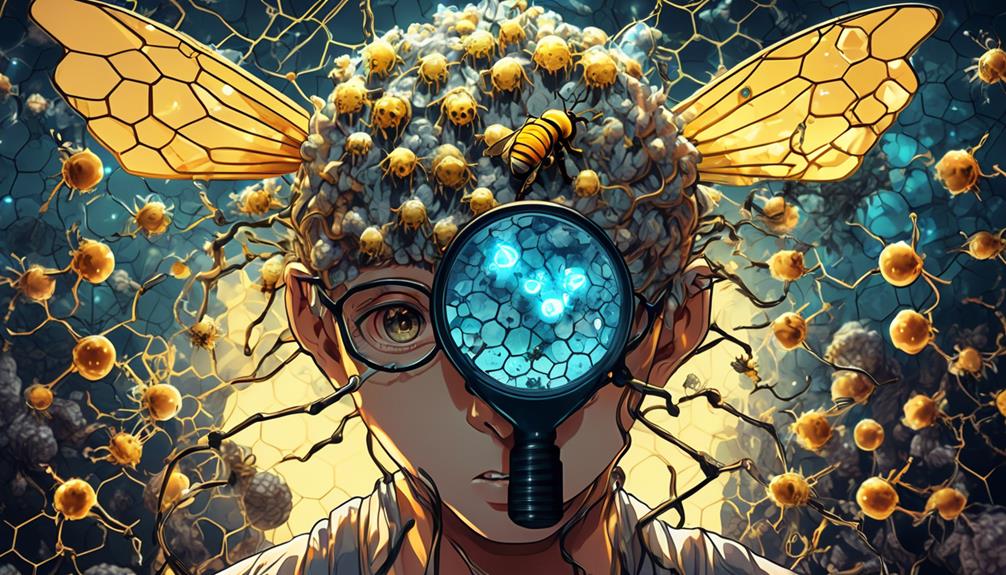
Delving into the science of fear detection, it's important you understand that researchers believe bees can sense certain pheromones associated with fear in other creatures. Pheromones are chemical substances produced and released into the environment by a creature, affecting the behavior or physiology of others of its species. When you're afraid, your body releases a specific blend of these pheromones, which bees can detect.
This detection isn't accidental. Bees have an organ known as the antennae, which contains olfactory receptors. These receptors are adept at picking up pheromone signals from the air. In the case of fear-associated pheromones, bees use their Johnston's organ, a sensory structure in their antenna, to detect these particular signals.
It's crucial to note that this isn't merely a response to scent. Bees interpret the pheromone signals and react accordingly. In essence, the bees aren't simply smelling fear; they're responding to the chemical signals your body emits when you're afraid.
This revelation indicates a profound level of inter-species communication that we're only just beginning to understand. It's a testament to the complexity of nature and its inhabitants.
Bees and Human Interaction
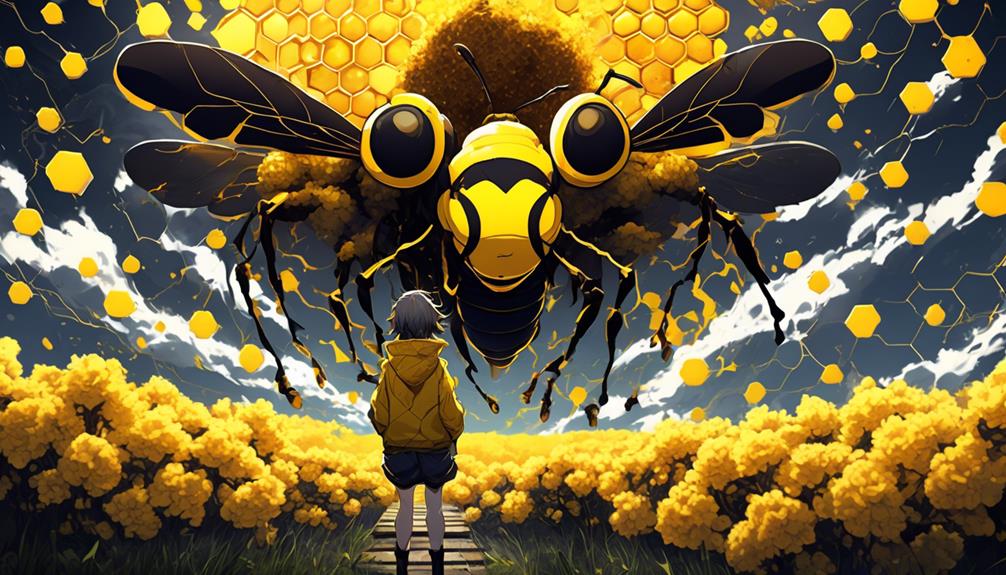
Understanding the science behind bees' fear detection capability, it's intriguing to examine how this translates into their interactions with humans. You might be surprised to learn that bees, like many other insects, are highly sensitive to human emotions. They're attuned to the pheromones emitted when humans experience fear, which can, in turn, affect their behavior.
When you're around bees, remember that they can sense your anxiety. If you're calm and unthreatening, the bees will likely ignore you. However, if you're nervous and your body is releasing fear pheromones, the bees may perceive you as a threat and react defensively. This doesn't mean they can understand or empathize with your emotions, but rather, they're reacting to the specific chemical signals your body emits.
Moreover, bees are attracted to certain scents and repelled by others. For instance, they're known to dislike the smell of fear and adrenaline. This could explain why individuals who are afraid of bees seem to get stung more often.
The more you understand about this fascinating interplay between bees and humans, the better you can navigate situations involving these industrious insects.
Pheromones: Nature's Communication Tool

In exploring the realm of pheromones, you'll quickly discover that these chemical messengers play an integral role in the world of bees, serving as Nature's sophisticated communication tool. These chemicals are excreted by bees to trigger a social response in members of the same species. They're vital for various bee behaviors such as hive recognition, mate attraction, and alarm signaling.
You'd be intrigued to know that honey bees utilize pheromones in an exceptional way. The queen bee, for instance, releases a unique pheromone blend that regulates the hive's social structure. This 'queen substance' suppresses the development of new queens, encourages worker bees to forage, and induces the drones' sexual behavior.
Alarm pheromones, on the other hand, are released by guard bees or bees that are injured. When a threat is perceived, these pheromones act as a biological alert, stimulating defensive behavior among the hive's members.
Therefore, pheromones aren't just chemical signals; they're the lifeblood of bee communication. They govern complex behaviors, ensuring the survival and prosperity of the hive. Understanding these chemical messages might provide further insight into how bees interact with their environment, including potential responses to human fear.
Studies on Bees Sensing Fear

You might wonder if bees can truly sense human fear, and numerous studies have attempted to unravel this intriguing possibility. It's important to note that bees don't possess the same emotional understanding as humans. They react to certain biochemical changes in their environment, not the emotional state itself.
One study found that bees can detect changes in the carbon dioxide levels in our breath when we're stressed or anxious. They're finely tuned to these changes, as high levels of CO2 can indicate a threat, prompting defensive behaviour.
Another interesting research focuses on the effect of human sweat. A group of German scientists discovered that bees can respond to the smell of fear-induced sweat differently than to regular sweat. It's suggested that our fear sweats contain specific pheromones that bees can accurately perceive, causing them to act more aggressively.
Finally, a study from the University of California found that bees might respond to the fear pheromones of other bees. When a bee is scared, it releases an alarm pheromone that alerts the hive to potential danger.
These studies, while still in early stages, indicate that bees may have a far more complex and acute sense of their environment than we've previously understood.
Implications and Future Research

Building on these initial findings, let's now explore the potential implications of bees' sensitivity to fear and the promising directions for future research. Should these preliminary results hold true, it could drastically reshape our understanding of bee behavior and potentially open up new avenues for pest control.
Thus far, we've understood bees' actions as largely instinctual, driven by environmental factors and the need for survival. However, if bees can sense fear, it could indicate a level of emotional perception previously unacknowledged in such creatures. This could lead to a reassessment of the cognitive abilities of bees and other insects, expanding our knowledge of animal behavior.
In terms of future research, it's imperative to confirm these findings through rigorous testing. You could apply advanced methods such as neuroimaging to delve deeper into the neural mechanisms behind this phenomenon. Expanding the study to include other emotions could also be rewarding. If bees can sense fear, can they detect other emotions as well?
Moreover, if we can manipulate bees' sensitivity to fear, we might develop novel pest control strategies. By triggering fear in harmful species, we could potentially deter them from certain areas. However, any such application must be approached ethically, considering bees' ecological significance.
Frequently Asked Questions
What Are Some Common Misconceptions About Bees' Ability to Sense Fear?
You might've heard that bees can sense fear. However, this is a common misconception. Bees lack the emotional empathy and complex brains needed for such perception. They're not akin to dogs, which can smell pheromones.
Bees react more to physical cues like swatting or jerky movements. So, don't fret, your fear isn't making bees more likely to sting you. It's more about how you act, not how you feel.
How Do Other Animals' Fear Detection Abilities Compare to Bees?
Examining other animals' fear detection abilities, you'll find contrasts and similarities to bees.
Dogs, for instance, can smell fear via pheromones.
Sharks sense fear through electrical signals from prey's rapid movements.
Snakes, on the other hand, detect fear from body heat and movements.
While bees' detection isn't scientifically proven, they're known to respond to fear-related behaviors.
It's crucial to note though, these abilities vary greatly across species.
Are There Any Notable Cultural Beliefs or Myths Related to Bees and Fear?
You'll find several cultural beliefs and myths surrounding bees. For instance, some cultures believe bees can sense human fear and react accordingly. Others link bees with death, associating their presence with impending doom. However, these are mainly superstitions and folklore.
Scientifically, it's unproven that bees can detect fear. They're known to react to certain pheromones and behaviors, but associating this with human fear is a stretch.
How Does Fear Detection in Bees Affect Beekeeping Practices?
As a beekeeper, understanding fear detection in bees could potentially alter your practices. If bees can sense fear, they might become defensive, leading to more stings.
You'd need to remain calm, projecting confidence to keep them at ease. This could influence your choice of protective gear, methods of handling the hive, and even the time you spend around it.
It's an intriguing possibility that demands further scientific investigation.
Are There Any Specific Species of Bees That Are Better at Detecting Fear Than Others?
You're asking if certain bee species excel at fear detection.
Currently, there's no definitive evidence suggesting that some species are better than others in this regard.
Most studies examine bees broadly, without distinguishing between species.
It's important to remember that the concept of bees sensing fear remains largely theoretical, with much more research necessary to ascertain the validity and intricate details of such a phenomenon.
Conclusion
So, can bees really sense your fear? Current research suggests they might, through their advanced communication system and your pheromones.
However, further investigations are needed to fully confirm and understand this phenomenon.
Until then, it's best to stay calm around these intriguing insects. After all, understanding their behavior can't only help us coexist peacefully but also delve deeper into the fascinating world of animal communication.

